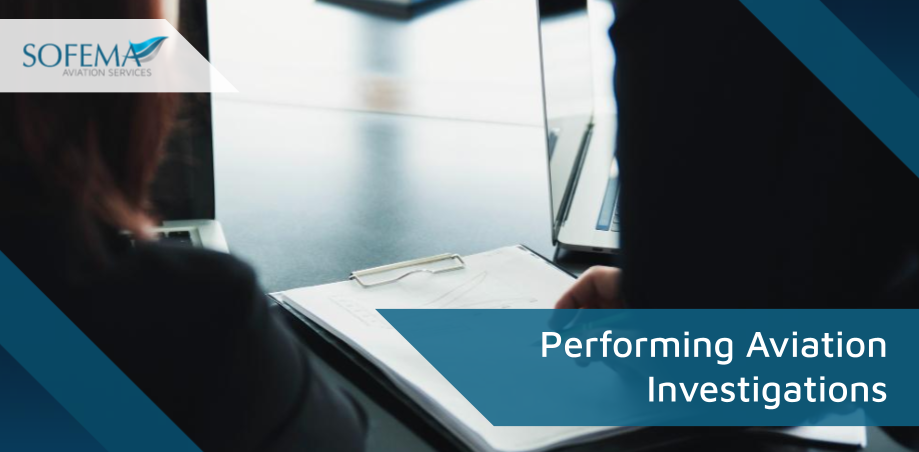Sofema Aviation Services (SAS), www.sassofia.com, considers the best practices for performing and managing aviation investigations, focusing on the Root Cause.
Introduction to Investigation Methodologies
- Aviation investigations require a nuanced understanding of both systemic issues and human factors. They are not merely about finding who is at fault but understanding the various contributing factors, from organizational culture to operational procedures and technical flaws.
Management of Systemic Factors
- Effective investigations also focus on managing systemic factors leading to human errors.
– This involves identifying and mitigating potential precursors that could cause or exacerbate errors. Understanding the broad context within which individuals operate is crucial for developing meaningful preventative measures.
Human Factors in Aviation Safety
- A key aspect of aviation investigations is the acknowledgement of the human element. It is understood that human error is inevitable to some extent.
– Therefore, investigations must consider how organizational cultures and procedures are designed to mitigate these errors and how they can be improved.
Challenges in Error Management
- Modern aviation systems are complex, which can obscure potential errors making them difficult to predict. Variability in human behaviour adds another layer of unpredictability.
– An investigation must thoroughly analyse these complexities and variabilities.
Systemic Approach to Design and Operation
- Investigators must examine how systems are designed to handle errors. This includes looking at fault tolerance, resilience to operational stress, and how these systems are integrated into daily operations.
Training and Error Awareness
Investigations often reveal gaps in training and awareness. Effective investigation practices involve assessing training programs to ensure they adequately cover the skills, knowledge, and awareness necessary to minimize errors.
Error Reporting and Data Analysis
- A robust error reporting system is vital. Investigations should evaluate how these systems function and whether they effectively capture data on errors without discouraging reporting due to fear of retribution.
Additional Human Error Considerations
If human error was simply the result of careless or reckless individual behaviour, managing human error would be straightforward in that disciplinary action could be measured against the event’s gravity.
- Many factors influence a task’s reliability, including the maintenance system, which shapes the technician’s performance.
- Management of the underlying factors can potentially deliver the mitigations which can diffuse or alleviate these precursors.
- Because of the “Human Element,” regardless of how much effort we put into the system, we will never fully eradicate our exposure.
Important Note: We can still aspire to deliver 100% reliability without achieving it for this to be a meaningful objective.
- We must accept that the philosophy of human factors views human error as both a standard and even expected component, regardless of the regulations, procedures or control environment we develop to “protect” the task.
- We also have to accept that it is incorrect to say that responsibility for human error may always lie within the system and never with the individual perpetrator of the error.
Challenges in Managing Human Error
- Complexity of Systems: Modern systems are highly complex, making it difficult to predict every possible error.
- Variability of Human Behaviour: Human behaviour is not always predictable, and variations can introduce errors that are hard to foresee.
- Increasing automation can lead to complacency, where operators rely too heavily on systems without maintaining an adequate level of awareness.
- A culture that focuses on blaming individuals for errors can lead to underreporting and a lack of transparency, which impedes learning from mistakes.
Best Practices in Error Management
- Systemic Approach: Focus on designing systems that account for human error by being more tolerant of faults and more resilient to operational stresses.
- Training and Awareness: Continuous training programs that focus on skills and knowledge and on awareness of human error tendencies can reduce error rates.
- Error Reporting Systems: It is crucial to encourage a culture of openness where errors can be reported without fear of retribution. These systems help gather data to understand error trends and develop preventive measures.
- Regular Reviews and Audits: Systematic reviews and safety audits help identify potential risks and assess the effectiveness of current practices.
- Balancing Accountability and Systems Thinking
- Accountability – While avoiding a blame culture that solely targets individuals is critical, it is equally essential to maintain accountability.
– A balanced approach recognizes that errors can result from systemic issues or individual actions.
– Effective management involves identifying when errors are systemically induced and when they are due to individual negligence and responding appropriately.
Next Step
Follow this link to our Library to find & download related documents for Free.
For guidance on available courses, please see www.sassofia.com or www.sofemaonline.com, or email team@sassofia.com
Tags:
aviation safety, Human Error, Human Factors, Investigation, SAS blogs, best practices, Aviation Investigation, Investigation Methodologies, Systemic Factors, Error Management, Error Awareness, Error Reporting Systems





